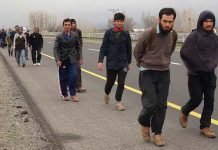
Gangs at the Turkish border with Iran have been abducting refugees from Afghanistan for ransom as well as assaulting them, BBC Turkish service reported.
According to the report gangs on the Iranian side of the border physically and sexually assault Afghan refugees who try to cross into Turkey. They take videos of the victims pleading with their families to pay the ransom in exchange for their freedom. The gangs demand $4,000 for each victim.
One Afghan man is seen in a video covered in dust and blood begging for help. “Whoever is watching this, I was abducted yesterday. They are demanding $4,000 for each of us, and they have been beating us day and night,” he said.
In another video a group of men are seen crawling on the ground while being whipped. Men are also seen begging for mercy while being sexually assaulted at knifepoint.
These gangs reportedly work with smugglers, and it is difficult for refugees to hide from them on the perilous journey to Turkey. The Turkish border with Iran is mountainous, and there are not many hiding places, leaving refugees vulnerable to such gangs as well as border security.
Several people who eventually managed to cross into Turkey spoke to the BBC about their ordeals with the gangs and the liability of Turkish authorities in these incidents.
One young Afghan woman in Istanbul, identified as Emine, said she and her husband were held captive for eight days. They were threatened with torture and death. When their family paid the ransom, they managed to escape the gangs, but Emine, who was pregnant at the time, lost her child.
Emine said they were captured by the gang after Turkish security forces pushed them back to Iran. According to human rights lawyer Mahmut Kagan, this is a common practice and a violation of international law.
Pushing refugees back to the countries they fled is illegal under the principle of non-refoulement, which forbids a country from forcing refugees or asylum seekers to return to a country in which they are liable to be subjected to persecution. Refoulement is also prohibited under the European Convention on Human Rights, the right to due process in the International Covenant on Civil and Political Rights, and Turkish law.
The number of irregular migrants deported from Turkey in 2022 increased by 159 percent compared to 2021, reaching 119,817, the highest figure in the country’s history, the Migration Management Directorate General said in a statement.
Turkey is deporting tens of thousands of Afghans directly to Afghanistan or pushing them back at its land border with Iran without checking to see if they are eligible for international protection, Human Rights Watch (HRW) said in a report released in November.
According to HRW, Afghans in Turkey are prevented from registering for international protection, and Afghans facing deportation are often not given the opportunity to apply for refugee status.
The number of refugees in Turkey is estimated at 3.9 million, including 3.6 million Syrians with temporary protection status and 320,000 others, mostly Afghans.














